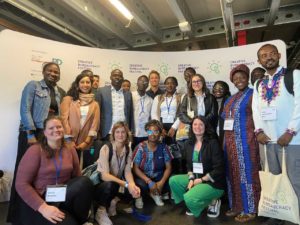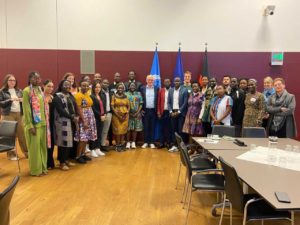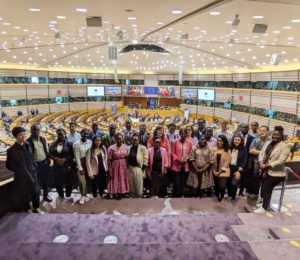Participants of this year’s Shaping Futures Academy completed their diverse in-person programme with site visits and study trips.
This has been an eventful month for the Shaping Futures Academy, with the Just Sustainability Transitions academic module making up the content and backdrop of the entire month. It began with expert guest speakers and facilitators from within and outside of IDOS providing the theory underlying sustainability transitions. The Shaping Futures Academy participants also heard from and engaged with experts on financing transitions, equity and other structural barriers as well as sustainability and environmental management. The Just Sustainability Transitions module also included peer learning projects that form a significant part of the module, as well as highlights such as an Advocacy Training by planpolitik and various site visits and study trips.
Some of these informative highlights involved visits to the International Union for Conservation of Nature (IUCN) and Deutsche Welle.
There were also several networking opportunities planned for the Shaping Futures Academy participants. On the evening of 5 June at the Botanical Garden in Bonn participants interacted with various partners of the Shaping Futures Programme. Also, a new format that enables IDOS employees interact with participants of the Programme and connect on common topics for discussion was introduced this year: “Connecting Sustainable Futures – IDOS meets Shaping Futures”. This interactive session resulted in very animated discussions on a range of topics such as global governance, sustainable agriculture, climate action and energy among others.

The study trip to Berlin coincided with the Creative Bureaucracy Festival in Kreuzberg, Berlin on 13 June. Following a day touring the political and cultural must-see sites in Berlin, this annual festival became a highlight for the participants, not only because of the networking opportunities but also of the thought provoking, creative and unique learning experience provided by the unconventional formats used to find solutions for community and government administrative matters. Omar Mohammed Kardous, a participant of this years’ Shaping Futures Academy Cohort joined other speakers for a workshop session on Citizen-Driven City Making.

The visit to Berlin also involved honoring an invitation by Armand Zorn, a Member of Parliament representing the SDP, at the German Bundestag. At the Federal Ministry for Economic Cooperation and Development (BMZ) premises, the participants had the opportunity for round table discussions on topics such as peace and security, climate and on different levels of policy formulation with representatives from the Federal Foreign Office as well as political foundations. The day at BMZ culminated in having an exchange with the State Secretary of BMZ, Jochen Flasbarth who hosted the participants for a discussion on questions relating to democratization and populism, peace and security as well as equal partnerships with African countries.

With the elections of the 2024 European Parliament having taken place earlier in the month and the study trip to Brussels coming up, the participants’ questions, reactions and need for dialogue were met by expert guest speakers Dr Niels Keijzer and Dr Jacqueline Götze, both IDOS, who engaged with the participants on the EU elections and its implications for EU-Africa relations. The trip to Brussels then offered the participants an immersive dive into European political systems particularly as relates to Africa. The participants had the opportunity to visit and engage in policy exchanges at the EU Parliament, the EU Commission, the European External Action Service (EEAS), which carries out the EU’s common foreign and security policy, and the Representation of North Rhine-Westphalia. Additionally, they met with representatives of GIZ and the Africa Europe Foundation Partnership who spoke about and discussed topics such as Green Transitions but mainly, the latest report on the State of Africa-Europe, published in February 2024. The report culminates two years of work tracking commitments made at the 6th European Union – African Union Summit in Brussels in February 2022. The visit to Brussels concluded with substantive exchanges and networking opportunities with experts from civil society and academia, enabling a deeper understanding of the European Policy space.
The academy concluded on 24 and 25 June in Bonn with presentations on peer group projects. The next phase (second online phase) begins on 2 September 2024.

Schreibe einen Kommentar